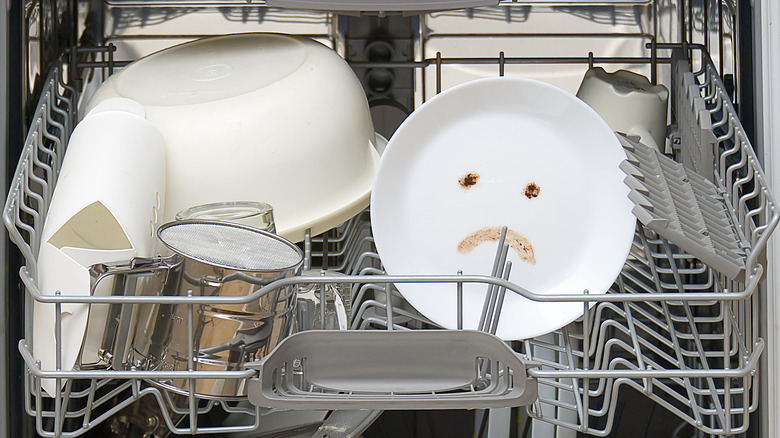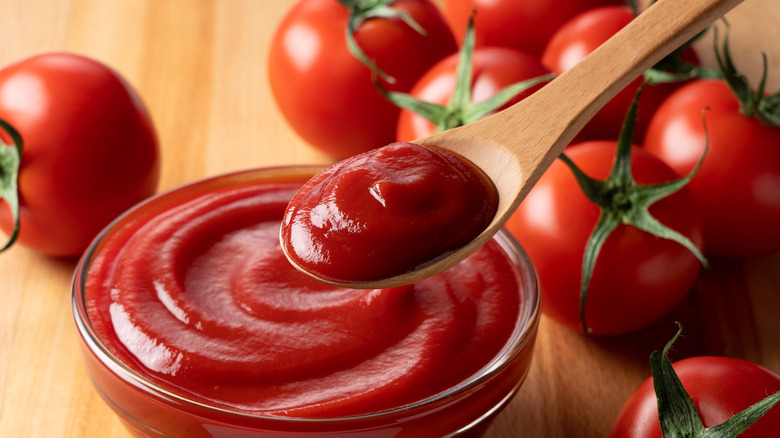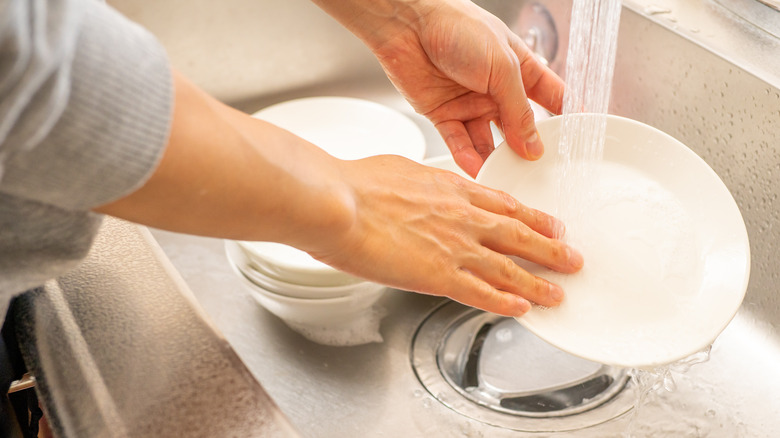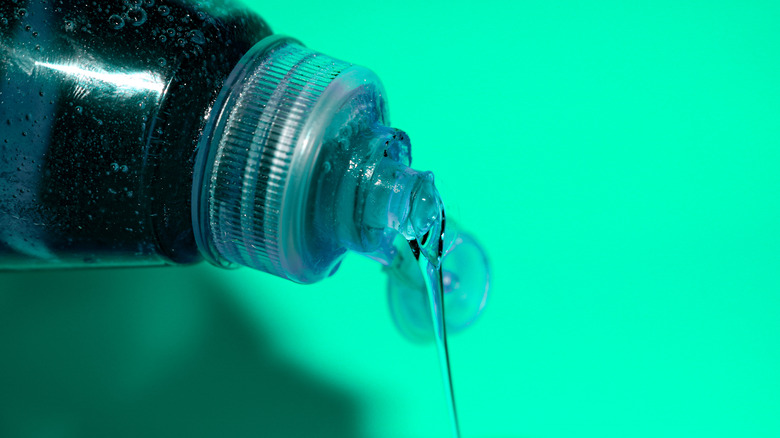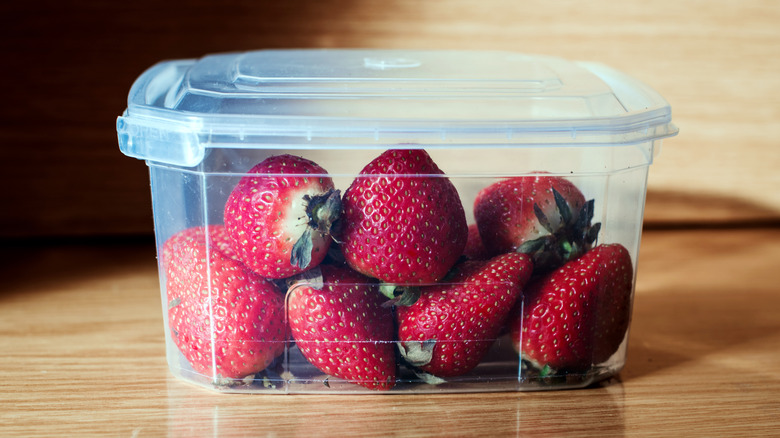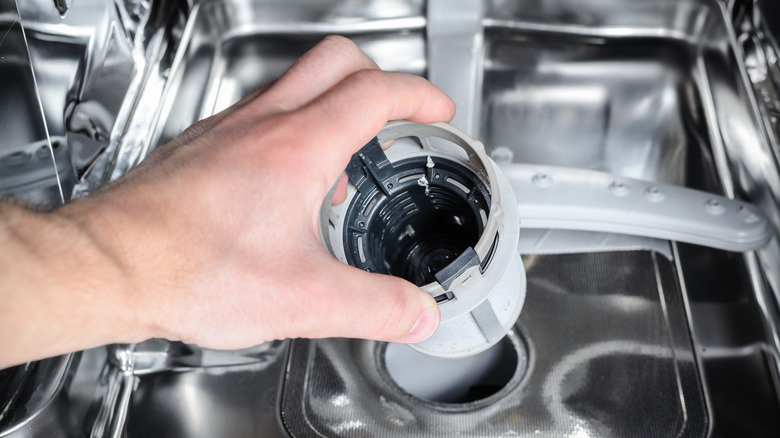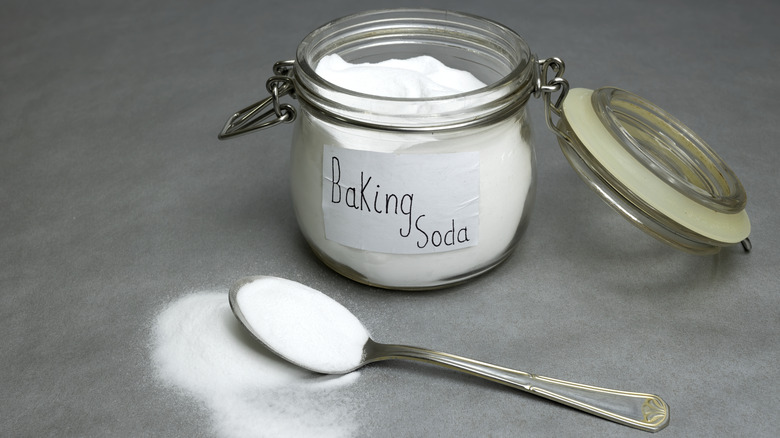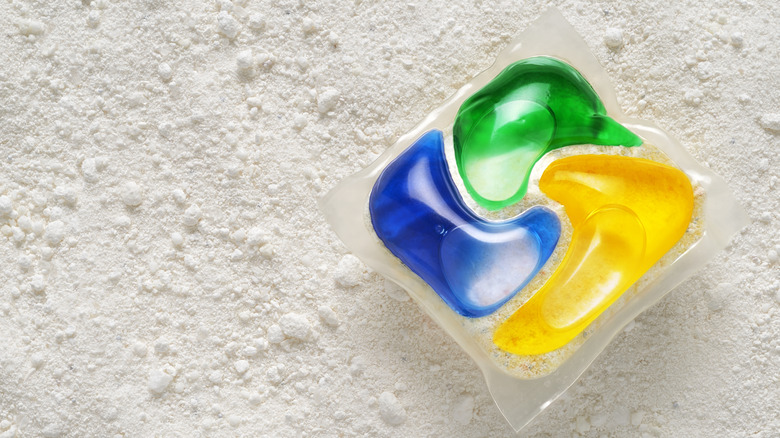The Biggest Mistakes You're Making With Your Dishwasher
Did you know that a woman invented the dishwasher? According to History.com, Josephine Cochran (or Cochrane) grew tired of spending hours washing fine china and came up with the "first commercially successful dishwasher." After winning an award at the World's Fair in Chicago, she went on to open a factory that manufactured dishwashers and sold them for as much as $300 a unit.
Of course, dishwashers cost a great deal more than $300 today. Then again, they are more sophisticated than that original prize-winning model. In fact, How Stuff Works notes that modern dishwashers are essentially robots — okay, maybe not robots, like from the Jetsons or Futurama – that, once loaded and turned on, handle tasks such as opening the detergent dispenser and spraying the dishes without human help. They can even sense how hot to make the water and — in some cases — when the dishes are clean.
Yes, if you think about it, dishwashers are impressive machines that are easy to take for granted. Just like your car, they need cleaning and maintenance. Plus, like any device, they have their limitations. Not everything you use to prepare or eat a meal is good to put in a dishwasher, and some items don't have a label that says "not dishwasher safe." But, by keeping in mind a few tips when it comes to your dishwasher, you can not only extend its "life," but also potentially avoid ruining other important items in your kitchen.
Don't wash knives in the dishwasher
From chopping herbs to dicing vegetables to carving the annual Thanksgiving turkey, knives are a staple of kitchen tools. And, so, giving them a thorough washing in the dishwasher might seem like a good way to keep your knives clean. But, as Kitchn reported, six different experts in the cutlery industry all advise against washing knives in the dishwasher.
Josh Moses, co-founder at Misen (a company that manufactures kitchen tools, including knives), told Kitchn that the conditions inside a dishwasher can wreak havoc on knives. "The high temperature and moisture of the dishwasher can seriously damage both the steel and the handle," he explained. Also, he said that knives can get bounced around inside the dishwasher, which can dull them and damage other items in the dishwasher (not to mention the dishwasher itself). Additionally, he cautioned that ceramic knives could chip and break inside a dishwasher.
Besides the way a dishwasher cleans items, dishwashing detergent can discolor and dull knives, according to Kitchn. For these reasons, carefully handwashing your knives is the better way to care for them. Specifically, cookbook author Eivin Kilcher told Kitchn that hot tap water is great for cleaning knives and that soap is not always necessary if the water is hot but not boiling. Also, always make sure to dry your knives after washing — as opposed to letting them air dry.
Keep wooden spoons away from the dishwasher
Putting knives in the dishwasher is a bad idea for many reasons — one being that knives can have wooden handles, according to Kitchn. But another major concern when it comes to kitchen utensils and dishwashers is the wooden spoon. As Heather Terhune, executive chef of Tre Rivali and The Outsider, told Eat This, Not That!, "Never let [wooden spoons] soak in water, and never ever put them in the dishwasher."
As Eat This, Not That! explains, washing wooden spoons in the dishwasher could cause them to become cracked. This is because of how hot the inside of a dishwasher can become, especially during the drying cycle. And, unfortunately, once wood starts cracking, bacteria can begin growing inside — this has the potential to contaminate your food. But, wait, isn't wood already porous? Yes, but, as Ben Chapman, a professor and food safety researcher at North Carolina State, told marthastewart.com, wood has natural defenses against bacteria. However, Chapman cautions that not completely drying wood can throw off those defenses, allowing bacteria to grow.
The bottom line: Using a dishwasher to clean wooden spoons could damage them and make them more susceptible to bacteria. The best way to clean wooden spoons, as Terhune told Eat This, Not That!, is to wash wooden spoons by hand. Marthastewart.com advises putting freshly washed wooden spoons in a place with air flow and allowing them to dry for at least 24 hours.
You don't need to pre-rinse dishes
Chances are, if you grew up in a home with a dishwasher, you were instructed to pre-rinse the dishes. And, if you asked why, you were probably told that not doing so would result in unclean dishes with caked on bits of food. Well, if you find this step annoying, there's good news: The pre-rinse is no longer the rule, especially for modern dishwashers.
As Morgan Brashear, Cascade scientist with Procter & Gamble, told Today, "Believe it or not, it's actually more beneficial to not rinse your dishes before putting them into the dishwasher." The dishwashers of today not only have their own version of the pre-rinse, but they also can detect how much dirt is stuck to your dishes. Because of this, pre-rinsing them in the sink actually can trick the dishwasher's sensors into thinking the dishes aren't as dirty as they actually are. This leads to a shorter cycle and a greater chance of food residue clinging to your dishes.
Although you don't have to pre-rinse your dishes, that doesn't mean you shouldn't scrap them of any leftover food. As cleaning expert Maeve Richmond told Today, "Too much solid food residue during a wash can slow things down." So, if someone in your family leaves a broccoli stalk on their plate, you definitely should throw that away. But, if they leave a few breadcrumbs, there's no need to scrub them off completely.
Never use liquid dish soap in the dishwasher
Imagine this: You purchase a dishwasher for the first time and are eager to try it out. You quickly load it up before realizing you're out of dishwasher detergent. With a shrug, you decide to fill the dishwasher's detergent compartment with liquid dish soap. Chances are, you're thinking this is a terrible idea, but, just in case this thought ever crossed your mind, here are some good reasons why you should never swap these two types of soap.
Think for a moment about what happens to water when you add liquid dish soap: It becomes like a bubble bath, full of suds. As a matter of fact, that's how such soap products are designed to work, according to The Spruce. But dishwasher detergent does not create suds. So, if you use liquid dish soap in a dishwasher, you'll end up with a sudsy mess leaking all over the floor like something out of a sitcom. Plus, your dishes and utensils might come out with soapy residue, meaning you'll have to clean them again — only, this time, with plain water.
Besides liquid dish soap being a bad idea for use in dishwashers, detergents made for dishwashers should not be used for handwashing dishes and other kitchen items in the sink. As The Spruce notes, you're more likely to add more dishwasher detergent to a sink of dishes because of the lack of suds. This can lead to problems rinsing your dishes clean.
Don't put plastic items on the lower rack
Plastic containers are practically kitchen essentials. Storing leftovers in them is as easy as snapping on a lid. But, as an article from The Washington Post points out, sometimes these containers are difficult to clean, and running them through the dishwasher can make a bad situation worse.
So, what makes plastic such a potentially problematic material? Well, as Carolyn Forte of the Good Housekeeping Institute told the publication, "Plastic may look smooth as glass, but under a microscope you'll see it's actually a rough surface." This means food is more likely to stick to plastic than other materials, leading to stains. Plus, the rough surface on plastic containers leads them to come out of the dishwasher damp. But, even worse, putting plastic containers on the lower rack of the dishwasher increases the chances they become warped. Why? Because the machine's heating elements are nearest to the lower rack.
To avoid warping your plastic containers, Brian Sansoni, spokesman for the American Cleaning Institute, told The Washington Post that loading them in the middle of the top rack reduces the chances they will melt. He also recommends looking at where the water is spraying and positioning your containers so the spray hits the dirtiest parts of them directly. And, to avoid your plastic containers flipping around inside the dishwasher, Sansoni recommends putting them inside a mesh laundry bag or securing them with a wire drying rack.
Remember to check your dishwasher's filter
Imagine this: Your dishwasher has always been reliable, but, one day, you notice it's not getting the dishes completely clean. Since the machine has always worked well in the past, you start using a different detergent, but even that doesn't help. Suddenly, you get a sinking feeling that your machine is broken and either needs expensive repairs or needs to be replaced entirely. But, before you start worrying, there could be a simple, inexpensive fix.
As The Spruce explains, dishwashers have filters under the lowest rotating spray arm that trap things like crumbs and residue. But, when the filter becomes clogged, there's nothing to prevent bits of food from being circulated over all your dishes. This is why you need to remove, soak, gently scrub, and rinse the filter at least once a month to avoid the above scenario. You'll also need to clean the filter's housing, which also gets dirty, especially if your filter hasn't been cleaned in a while.
Now, if you have an older dishwasher, you might not need to worry about cleaning the filter since these older models were set up similar to a garbage disposal. However, newer models don't have this function. And, if you're wondering which type of dishwasher you have, think about how much noise your dishwasher makes. If it's pretty loud, it probably has a self-cleaning filter. We recommend, though, looking your model up online or calling the manufacturer to make sure (per The Spruce).
Make sure to clean your dishwasher
Since it constantly has detergent and water being sprayed inside of it, it's understandable to think that dishwashers basically clean themselves. But, while that's logical to think, it's, unfortunately, not the case. According to Architectural Digest, dishwashers need a thorough cleaning once every six months. And, no, just running the dishwasher without dishes in it isn't enough.
As Architectural Digest explains, you need to remove everything from the dishwasher before cleaning it. This means taking out the racks, the utensil holders, and even the filter. Next, clean the spray arms, including the holes where the water comes out. In general, you should check for any small areas where food residue and soap scum might get stuck. Once you're done, pour a cup of white vinegar into a dishwasher-safe bowl, and place it inside the dishwasher. And, yes, you are going to run it on a hot water cycle, but, remember, don't put detergent in the detergent compartment — the white vinegar is all you need for this step.
To finish cleaning your dishwasher, the magazine recommends removing the bowl after the hot water cycle has completed, sprinkling a cup of baking soda over the bottom of the dishwasher, and running one more cycle. Additionally, keep in mind that some dishwashers have a self-cleaning sanitize cycle that can be run once a month to keep your dishwasher cleaner between six-month deep cleans.
Never put cast iron skillets in a dishwasher
With all the new kitchen gadgets at various price points, it's easy to forget that, sometimes, there's just no replacing classic culinary tools. Case in point: the cast iron skillet, where, as Kitchen Snitches points out, it takes time (and some special care) to give it a special coated surface that infuses foods with flavor. However, put one of these skillets in the dishwasher, and you run the risk of ruining this kitchen tool.
According to Kitchen Snitches, cast iron skillets should never go in the dishwasher for two major reasons. First, according to Reliance Foundry, they're mostly made of iron. Unfortunately, this means they're more likely to rust. Also, cast iron skillets have rough finishes, making the iron more vulnerable to water. This is why regularly baking oils in these skillets (a process known as seasoning) is so important — not only to give foods that special flavor but also to shield the skillet against rusting. And, if you guessed that the detergents used in dishwashers can remove that protective coating, you'd be absolutely right.
The good news is that thoroughly scrubbing and then seasoning a dishwasher-cleaned cast iron skillet could save it, according to Kitchen Snitches. However, one seasoning isn't going to restore a cast iron skillet coating that's taken years to build up, so food cooked in it might no longer taste the same.
Don't wash travel mugs in a dishwasher
Let's face it: Travel mugs can be a commuter's best friend. Need coffee first thing in the morning but don't have the time to sit and drink it? No problem, just pour it into your travel mug and go. However, the insides of these convenient containers can get pretty gross by the end of the day, especially if you add things like cinnamon to your coffee. However, according to Taste of Home and Good Housekeeping, throwing these beverage holders into the dishwasher with the rest of your dishes can lead to a disgusting and possibly unhealthy situation.
As Taste of Home points out, not everything about your travel mug is safe to put in a dishwasher. Travel mugs are insulated, and the way dishwashers clean them could lead to water getting into those layers of insulation. Also, according to Good Housekeeping, putting a travel mug in a dishwasher can cause water to get caught under its removable seal. Either of these scenarios sets up the perfect conditions for mold to grow inside your travel mug.
Of course, you do want to regularly clean your travel mug (and reusable water bottle), but Good Housekeeping recommends handwashing it instead of putting it in the dishwasher. And, as Taste of Home notes, if you use soap to clean your travel mug, you should take the time to dry it with either a microfiber cloth or a paper towel.
Don't put fish or potatoes in the dishwasher
Lifehacks can sometimes be helpful, but this doesn't mean that every recommended "shortcut" is a good idea. Case in point: using a dishwasher to "cook" fish and "clean" potatoes. Yes, you read that right. As Consumer Reports notes, some people use their dishwasher to assist with food preparation. But, make no mistake, cooking and/or cleaning food in your dishwasher is a very bad idea.
First, let's talk about fish. According to Consumer Reports, one lifehack people use to prepare salmon is to wrap it in foil and put it inside the dishwasher. But, as Taryn Brucia, a spokesperson for LG, told Consumer Reports, "Water temperature will not be as consistent in a dishwasher as compared to a stove." In addition, she said, "There's also the question of whether certain foods (like fish and eggs) will be heated well enough in the dishwasher to kill pathogens like Salmonella." And, as the Centers for Disease Control and Prevention explains, Salmonella poisoning can cause fever, diarrhea, and stomach cramps — and can be fatal.
Besides the dangers of "cooking" fish in a dishwasher, another potentially harmful lifehack is putting potatoes on the top rack of your dishwasher to "clean" them, according to Consumer Reports. Even if you don't use detergent, there's still residue from previous dish washings in the dishwasher's water line — so the potatoes wind up being sprayed with soap that can end up in your meal.
Avoid using too much dishwasher detergent
Of course, using liquid dish soap in a dishwasher can lead to a sudsy mess, according to The Spruce. But that doesn't mean there aren't consequences for adding too much dishwasher detergent to your machine. And, unfortunately, even using pods isn't a guarantee you're putting the correct amount of detergent in your dishwasher.
An article from Kitchn explains what can happen when using too much detergent in a dishwasher. The author writes that her Miele entry-level model dishwasher began leaving a residue on her and her husband's glasses. After speaking to the company's customer support line, they learned that the convenient pods they were using in their dishwasher were causing their problems. This is because the pods contain too much detergent for their machine and were clogging up their dishwasher's drain.
The author of the Kitchn article explains that she and her husband switched from pods to detergent powder. They also experimented with using less than the recommended amount of detergent until they found the right amount for their machine. In addition, the author recommends not basing how much detergent you put in a dishwasher on the size of its detergent compartment. Now, it's possible you've been using pods and never experienced any issues with your dishwasher. But, if you can get your dishes just as clean with less detergent, you'll not only possibly extend the life of your dishwasher, but you'll also save money.
